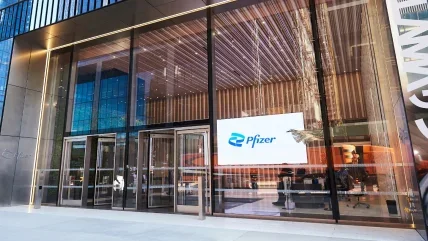
Pfizer and Astellas Pharma have shared new positive follow-up data for Padcev (enfortumab vedotin-ejfv) and Keytruda (pembrolizumab) in a Phase 3 urothelial cancer trial.
The EV-302 clinical trial tested Padcev and Keytruda in 886 patients with untreated locally advanced or metastatic urothelial cancer (la/mUC).
Seagen and Astellas have partnered with Merck (known as MSD outside the US and Canada) to assess their Padcev with Merck’s Keytruda in patients with previously untreated metastatic urothelial cancer.
In September last year, Merck secured the European Commission approval for Keytruda with Padcev to treat urothelial cancer.
The latest results have shown sustained overall survival (OS) and progression-free survival (PFS) benefits after 29.1 months of follow-up.
These findings align with earlier results from the primary analysis after an additional 12 months of follow-up.
According to the results, enfortumab vedotin plus pembrolizumab reduced the risk of death by 49% compared to chemotherapy.
The median overall survival (OS) was 33.8 months for the combination, versus 15.9 months for chemotherapy.
This OS benefit was observed across all prespecified subgroups, including both cisplatin-eligible and ineligible subgroups.
The combination also reduced the risk of disease progression or death by 52% versus chemotherapy, with a median progression-free survival (PFS) of 12.5 months versus 6.3 months for chemotherapy.
The safety profile remained consistent with prior data, with no new safety concerns identified.
Pfizer will also present data from an exploratory analysis evaluating treatment outcomes and the safety profile in patients with confirmed complete response (cCR).
Enfortumab vedotin plus pembrolizumab showed a 67.5% confirmed objective response rate (cORR) compared to 44.2% for chemotherapy.
Pfizer chief oncology officer Roger Dansey said: “The updated EV-302 results show sustained long-term efficacy in a broad population that includes both cisplatin eligible and ineligible patients and reinforce this combination’s ability to reshape the urothelial cancer treatment landscape.”
Padcev with Keytruda is approved for adult patients with la/mUC in the US, European Union (EU), Japan, and other countries.
Enfortumab vedotin is also approved as a single agent for patients with la/mUC.
Astellas senior vice president and oncology development head Ahsan Arozullah said: “The combination of enfortumab vedotin and pembrolizumab was the first approval to offer an alternative to platinum-containing chemotherapy, which had been the standard of care for first-line locally advanced or metastatic urothelial cancer for decades.
“We are delighted that the additional follow-up results of the EV-302 trial show a durable benefit.”






